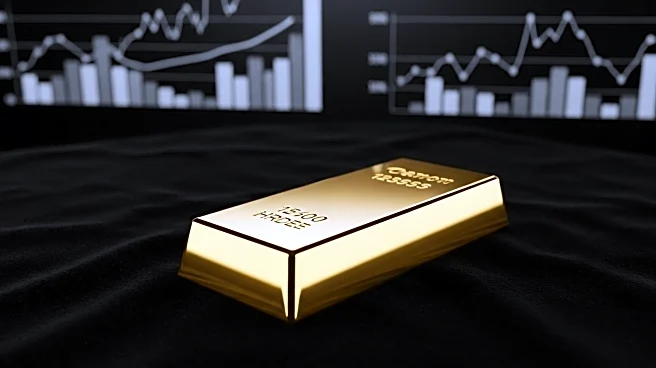What is the story about?
What's Happening?
Goldman Sachs has issued a warning that gold prices could reach $5,000 per troy ounce if the independence of the U.S. Federal Reserve is compromised. The investment bank's analysis suggests that a shift of just 1% of the privately owned U.S. Treasury market into gold could trigger this price increase. Concerns have arisen due to President Trump's efforts to exert control over the Federal Reserve, including attempts to remove Fed Governor Lisa Cook. These actions have led to fears of higher inflation and lower stock and bond prices, prompting investors to consider gold as a safer alternative.
Why It's Important?
The potential compromise of the Federal Reserve's independence could have significant implications for the U.S. economy and financial markets. If investors lose confidence in traditional safe havens like the U.S. dollar and government bonds, gold could become the preferred asset, driving up its price. This shift could impact various stakeholders, including investors, policymakers, and financial institutions, as they navigate the changing landscape. Goldman's analysis underscores the importance of maintaining institutional trust and stability to prevent economic disruptions and protect the dollar's reserve currency status.
What's Next?
As concerns over the Federal Reserve's independence persist, investors may continue to adjust their portfolios, increasing their holdings in gold and other value stocks. The market may experience further volatility as stakeholders react to potential changes in monetary policy and inflation expectations. Policymakers and financial leaders may need to address these concerns to restore confidence and ensure economic stability. The ongoing debate over the Federal Reserve's role could lead to legislative or regulatory actions aimed at safeguarding its independence and preserving market trust.
Beyond the Headlines
The situation highlights broader issues related to the politicization of monetary policy and its impact on global financial markets. The potential erosion of the Federal Reserve's independence raises ethical and governance questions about the separation of powers and the role of central banks in maintaining economic stability. Long-term implications could include shifts in international perceptions of U.S. financial institutions and changes in global investment strategies. As gold becomes a focal point for investors, discussions on its role as a safe haven asset may intensify, influencing future market dynamics.
















